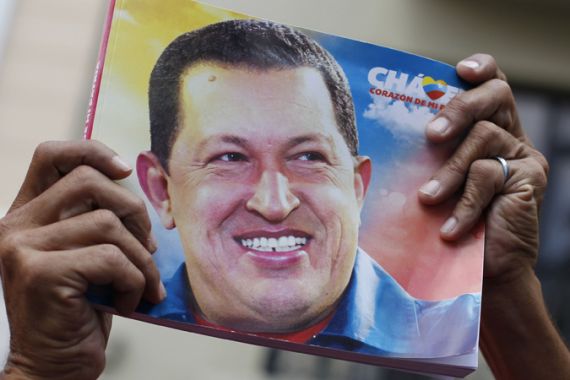Chavez’s ‘polarising’ death
Although villainised as “polarising” by the media, Chavez enjoyed broad support at home, especially among the poor.

Back in 2010, the Venezuelan anti-government opposition underwent a typical bout of hysteria in response to President Hugo Chavez’s proposed plan to import Ramiro Valdes, Cuba’s Minister of Information Technology and Communications, to help rectify the Venezuelan electrical crisis.
Antonio Ledezma, the mayor of Caracas, was quoted in the opposition daily El Nacional confirming that Valdes, “far from knowing anything about electrical matters[,]… is more of a specialist in electrocuting people whose opinions differ from those of the regime”.
Of course, this assessment failed to jibe with other anti-Valdes arguments in the opposition arsenal such as those concerning the non-existence of electricity in Cuba, which would seem to impede the practice of electrocution.
Meanwhile, the neoconservative American Enterprise Institute’s Roger Noriega – inventor of such conspiracies as “Chavez’s Secret Nuclear Program” – chimed in with the alarming news that “[t]ens of thousands of Castro’s finest form a shadow government in Venezuela today”.
Less hallucinated forms of imperialism might however include US militarisation and destructive economic policies in Latin America, not to mention involvement in the 2002 coup against Chavez.
The death of polarisation?
According to the ever-incisive lexicon of the US mainstream media, Chavez’s death constitutes the end of “a polarising figure“.
This raises the question of why the crime of polarisation is not instead attributed to the elites who have dominated the country at the expense of the poor majority. After all, even the New York Times‘ Simon Romero concedes:
Though [Chavez] met opposition at home, he enjoyed broad support, in part by going into the slums to establish health clinics staffed by Cuban doctors and state-run stores selling subsidised food. These and other social welfare programmes could be corrupt and inefficient, but they made the poor feel included in a society that had long ignored them.
Given the established media’s conviction that the proper way for poor citizens of the world to improve their lot in life is via US-directed corporate globalisation schemes, it is unsurprising that alternative methods are portrayed in a fundamentally negative light.
In a telling contrast, historian Greg Grandin notes in his Chavez obituary for The Nation that Venezuela’s pre-Chavez incarnation as “the anti-Cuba” was hailed by the US State Department and its intellectual accomplices as the epitome of democratic development despite the following inconvenient details:
Every sin that Chavez was accused of committing – governing without accountability, marginalising the opposition, appointing partisan supporters to the judiciary, dominating labour unions, professional organisations and civil society, corruption and using oil revenue to dispense patronage – flourished in a system the US held up as exemplary.
As for the alleged polarisation campaign, Keane Bhatt – blogger for the North American Congress on Latin America (NACLA) – draws attention to statistics eschewed by the media when discussing Chavez’s legacy, such as the reduction of income inequality to the lowest in Latin America and the reduction of absolute poverty by 70 percent.
Closing the gap
In a dispatch from 2010 concluding that Venezuela was deadlier than Iraq, the Times‘ Romero wondered “why the [Chavez] government – despite proclaiming a revolution that heralds socialist values – has been unable to close the dangerous gap between rich and poor and make the country’s streets safer”.
Romero did not expand his curiosity to inquire whether entrenched elite interests might prevent a spontaneous resolution of such a gap. In the aftermath of Honduras’ distinction as homicide capital of the world, he refrained from pondering whether the right-wing Honduran regime – an obsequious US ally installed courtesy of a US-facilitated coup – should be blamed for the violence. Such a question would have been more than valid as the regime is killing its own citizens.
As for other relevant comparisons to Iraq, it is worth noting that Venezuela was not spending an estimated $720m a day in 2007 presiding over a war in the said Middle Eastern locale. According to a Washington Post article that year, the American Friends Service Committee determined – based on the work of economist and Nobel Prize recipient Joseph E Stiglitz and Harvard University’s Linda J Bilmes – that the cost of one day of war could purchase health care for 423,529 US children.
It shouldn’t be difficult, for anyone endowed with a reasonable capacity for logic, to recognise that providing one’s people with access to health care is far more helpful to humanity than killing other people abroad. In the case of Venezuela, Chavez’s mandate brought not only nationwide free healthcare, but also perks for select foreign populations such as poor recipients of discounted heating oil in the US.
The CBS News obituary for Chavez refers to the “polarising” leader as a “US foil”. In the very least, he’s helped foil US attempts to mask its own polarising behaviour as democratic.
Belen Fernandez is the author of The Imperial Messenger: Thomas Friedman at Work, released by Verso in 2011. She is a member of the Jacobin Magazine editorial board, and her articles have appeared in the London Review of Books blog, The Baffler, Al Akhbar English and many other publications.
Follow her on Twitter: @MariaBelen_Fdez
